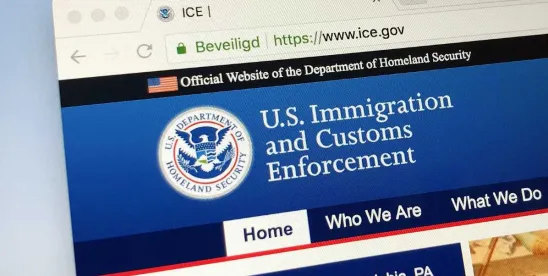Introduction
Since President Trump’s inauguration, the administration has underscored its commitment to prioritizing immigration enforcement. This shift includes an increase in U.S. Immigration and Customs Enforcement (“ICE”) raids and the rescission of previous policies that restricted federal immigration authorities from conducting enforcement actions in sensitive locations such as schools, churches, and hospitals. Given the new enforcement landscape, it is crucial for employers to be prepared for potential ICE raids or other immigration audits.
Preparing for an ICE Raid
An ICE raid is an unannounced operation conducted by ICE agents at businesses or homes to apprehend individuals suspected of violating federal immigration law. During a raid, ICE agents may question individuals present and detain or arrest specific persons. However, their authority to search private space is limited without a judicial warrant.
Specifically, ICE agents can enter public areas of a business, such as parking lots or lobbies, without restriction. However, they cannot access nonpublic areas without consent or a valid judicial warrant. In contrast, private spaces, such as a private home or office, are not generally accessible to the public and may even have signage indicating that they are intended to be private.
A judicial warrant, issued by a federal or state court and signed by a judge, specifies the search’s scope and location, which may include a private area. Employees must allow access to areas specified in the warrant but can refuse entry to nonpublic areas beyond the warrant’s authorizing scope.
In contrast, an administrative warrant, which is not issued by a judge, does not authorize ICE agents to enter private spaces without permission. It directs law enforcement to arrest or detain specific individuals suspected of immigration violations but does not impose a legal duty to comply with ICE demands.
If ICE agents present a warrant, company management should request a copy, verify its type and validity, and proceed accordingly. Legal counsel should be contacted immediately if there is any doubt about the warrant or its validity. It is also important not to interfere with ICE officers or impede their investigation in any way, as obstructing an investigation may result in significant criminal and civil sanctions.
To prepare for a potential enforcement action, employees should be trained on how to interact with ICE agents and who to contact if agents arrive. Employees should be counseled on their rights during an enforcement action. Employers should designate a point of contact knowledgeable about employers’ rights and trained to communicate with agents and legal counsel. Nonpublic areas should be clearly marked to delineate private spaces of a business from public areas.
Preparing for an I-9 Audit
With the heightened focus on immigration enforcement, an increase in I-9 audits and compliance investigations is anticipated. Federal law mandates that employers timely complete an I-9 form for each employee to verify employment eligibility. The Immigration Reform and Control Act of 1986 (“IRCA”) prohibits employing individuals unauthorized to work in the U.S. and requires employers to verify identity and employment authorization.
If the federal government initiates an I-9 audit, the employer will receive a notice of inspection (“NOI”) and generally will have three days to produce I-9 forms for review. If ICE determines that certain employees are unauthorized to work, the employer has ten days to provide valid work authorization for the employees, and if the employer is unable to do so the employees will need to be terminated. Affected employees must be notified of the audit findings.
To prepare for a potential I-9 audit, employers should ensure the use of the current Form I-9 and confirm all employees have proper work authorization. Conducting an internal audit with legal counsel can help identify non-compliance issues, allow for corrections to the I-9 forms, and demonstrate good faith if an NOI later is issued, which can help limit civil penalties against the employer. Contact legal counsel immediately upon receiving an I-9 NOI for guidance and compliance.
Conclusion
With the Trump administration’s focus on immigration enforcement, employers must be prepared for potential ICE actions including enforcement raids in their places of business.





 />i
/>i

